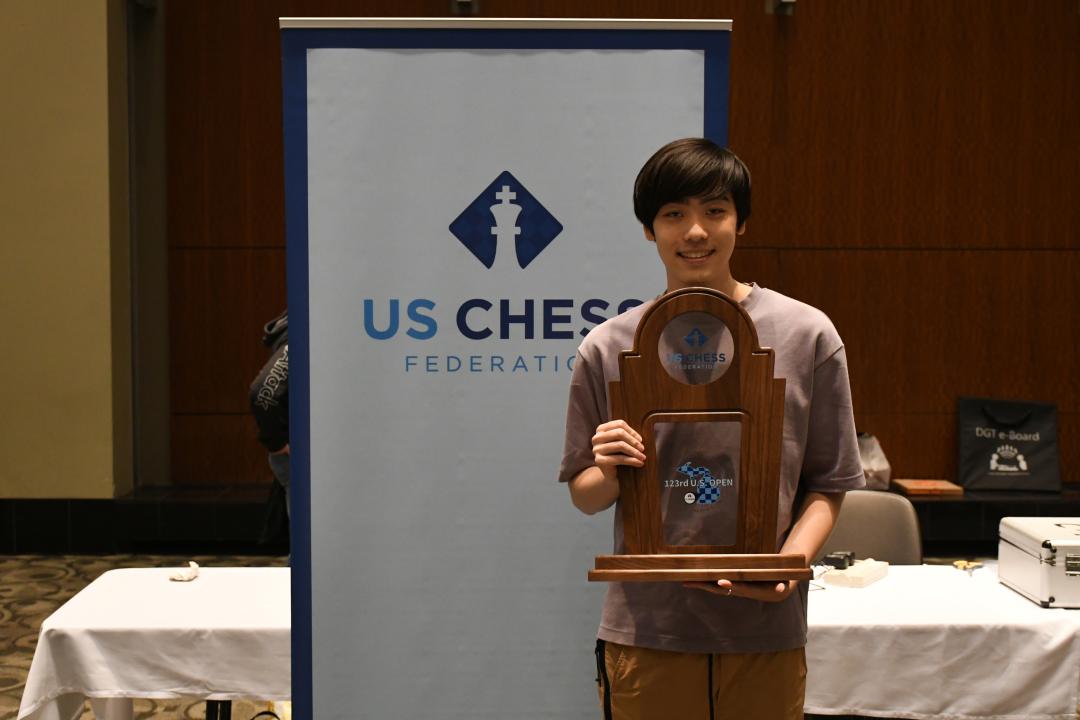2023 U.S. Open Champion
Patrick Tang said that his son, GM Andrew Tang, graduated from Princeton University and, at the end of August, will start as a quantitative trader at Susquehanna International Group (SIG). Tang will work at SIG’s Manhattan office. Before beginning that job, Patrick said that Andrew has one more tournament on his schedule, the Washington International on August 12–16.
Patrick Tang said that GM Nikola Mitkov is Andrew’s coach, both now and back when Andrew was very young. While Andrew was closing in on his International Master title, IM John Bartholomew was his coach.
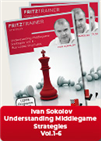 In this Videocourse we deal with different aspects of the middlegame which are important to study and improve your general understanding of chess structures.
In this Videocourse we deal with different aspects of the middlegame which are important to study and improve your general understanding of chess structures.GM Tang said his favorite game was his last round win over Grandmaster Varuzhan Akobian. He also enjoyed his round 5 win over FM Sharvesh Deviprasath.
Like Tang, Grandmaster Aleksey Sorokin also won his last round game. Both Tang and Sorokin finished with 8 out of 9 points. For their Armageddon playoff game, which had no increment, Tang bid 7 minutes and 52 seconds and Sorokin had 10 minutes. Tang had Black and draw odds. When Tang drew, he won the U.S. Open trophy and a $200 bonus.
By winning the U.S. Open, Tang qualified for the U.S. Championship, October 4–18 at the Saint Louis Chess Club. U.S. Open results are on this webpage.
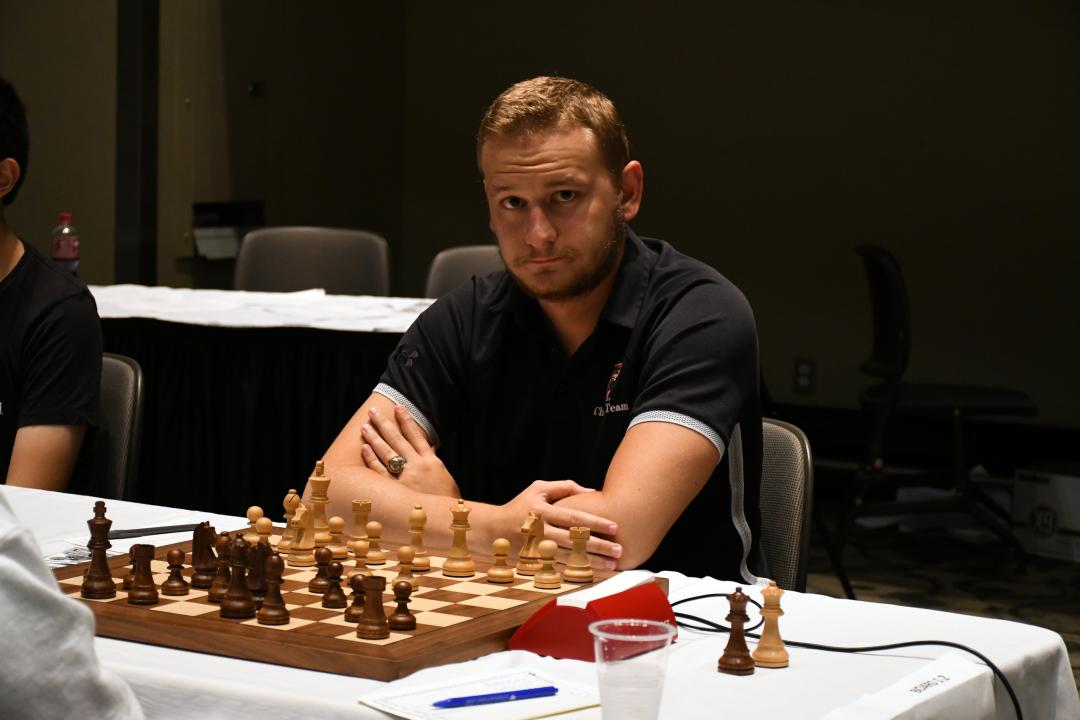
Alexey Sorokin | Photo: Daniel Day / U.S. Chess Federation
Committee Meetings
From August 2–4, US Chess committees met within the Amway Grand Plaza, which adjoins the DeVos Place Convention Center site of the U.S. Open chess games. With some committees meeting at the same time, but in different rooms, it was impossible to attend them all. For more about committees, check the Committee Reports webpage.
August 2 Meetings
Dan Lucas, Melinda Matthews, and Natasha Roberts shared successes of US Chess Communications. More people visit Chess Life Online post-Covid than pre-Covid. Pre-Covid, each month, Chess Life Online had 100,000 unique visitors; post-Covid, that number has grown to 120,000 unique visitors.
Lucas noted that Communications often promotes from within. His first role was Director of Publications; he is now Senior Director of Strategic Communication. Matthews started at US Chess as assistant editor and is now managing editor for all print publications. Art Director Roberts began her US Chess career as an editorial assistant.
Lucas is also a former Chess Journalists of America (CJA) President. The current CJA President, Joshua Anderson, and Mark Capron, editor of The Chess Journalist, led the CJA meeting. This year’s award recipients are posted at the CJA website. Anderson congratulated the Chess Journalist of the Year, Pete Tamburro. Tamburro founded American Chess Magazine, which won Best Overall Magazine.
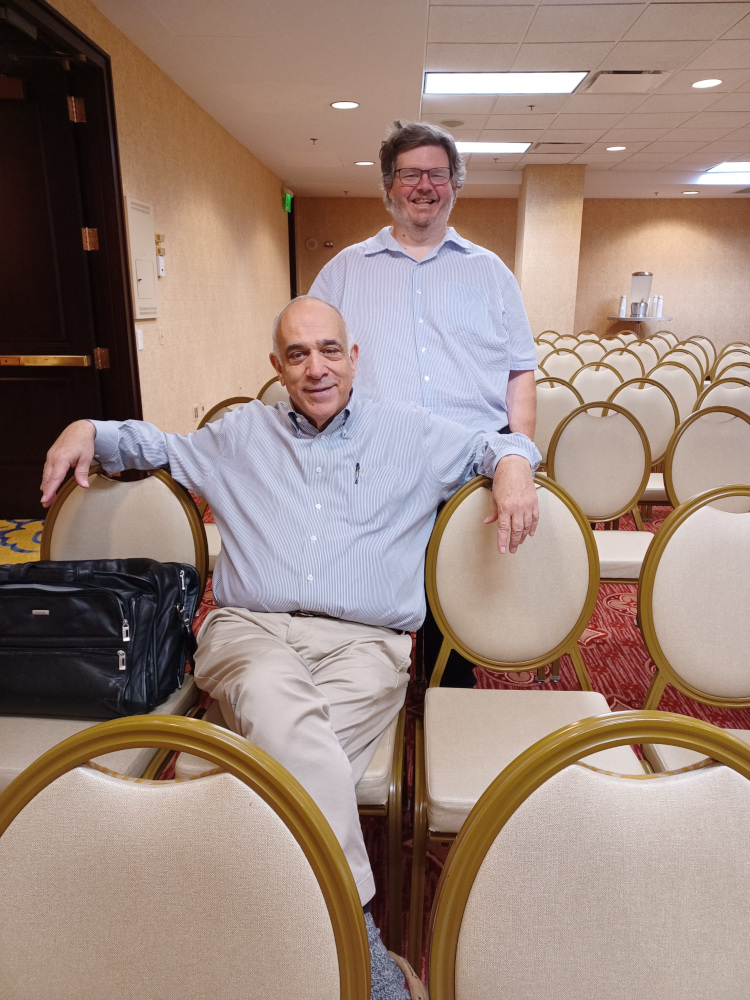
Pete Tamburro (seated) and Joshua Anderson | Photo: Alexey Root
Andrew Schley is Chair of the College Chess Committee. Joining him at the front of the room were past Chair Grandmaster Alexander Onischuk and committee members Jonathon Singler and Al Lawrence. The next Pan-American Intercollegiate Team Chess Championship will be held January 4–7, 2024, in McAllen, Texas.
Most committees met for one hour, but the Scholastic Committee was scheduled for two hours. One contentious topic was the best time control for US Chess national scholastic tournaments: Game in 90 minutes, with a 10-second delay (the current time control) versus Game in 60 minutes with either a 30-second increment or 30-second delay. Under the current time control, players may stop notating when either player has less than five minutes. Under the proposed time control, championed by Scholastic Council and Scholastic Committee Chair John D. Rockefeller V, players must record their moves throughout.
In addition to volunteering for US Chess, Rockefeller is known for his $3 million donation. Another major donor is Dewain Barber, the US Chess Dean of Scholastic Chess. On August 1, Barber had a book signing for Humor in Chess, books 1, 2, and 3.
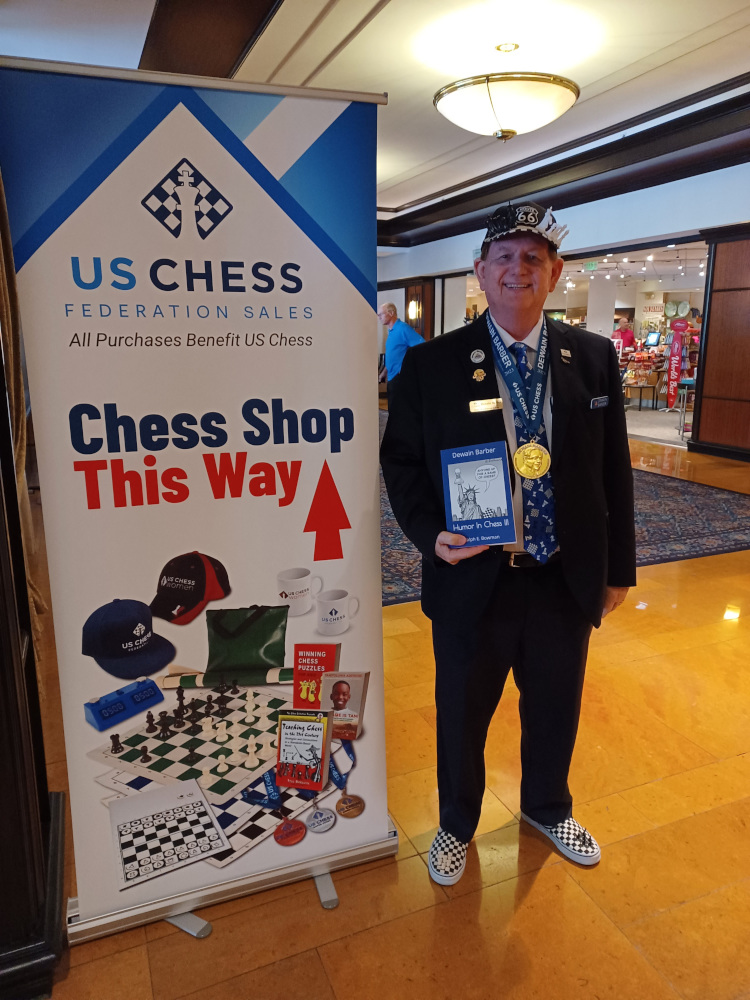
Dewain Barber | Photo: Alexey Root
August 3 Meetings
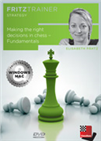 In a total of 6 chapters, we look at the following aspects: the right decision based on tactical factors, decisions in exchanges and moves, complex and psychological decisions in longer games and in defence.
In a total of 6 chapters, we look at the following aspects: the right decision based on tactical factors, decisions in exchanges and moves, complex and psychological decisions in longer games and in defence.Kicking off Thursday afternoon’s meeting was the Women’s Committee. Representing the committee were Leila D’Aquin, Kimberly Doo (Co-Chair), Maureen Grimaud (Co-Chair), and Robin Ramson. The committee repeated an announcement, first made in the Senior Committee, that Elizabeth Shaughnessy, with support from Jim Eade, will be organizing the first U.S. Senior Women’s Championship. At least six women aged 50 and older will be invited. A U.S. Senior Women’s Championship was initially proposed in my 2019 ChessBase article. The Women’s Committee’s initiatives are described in its report.
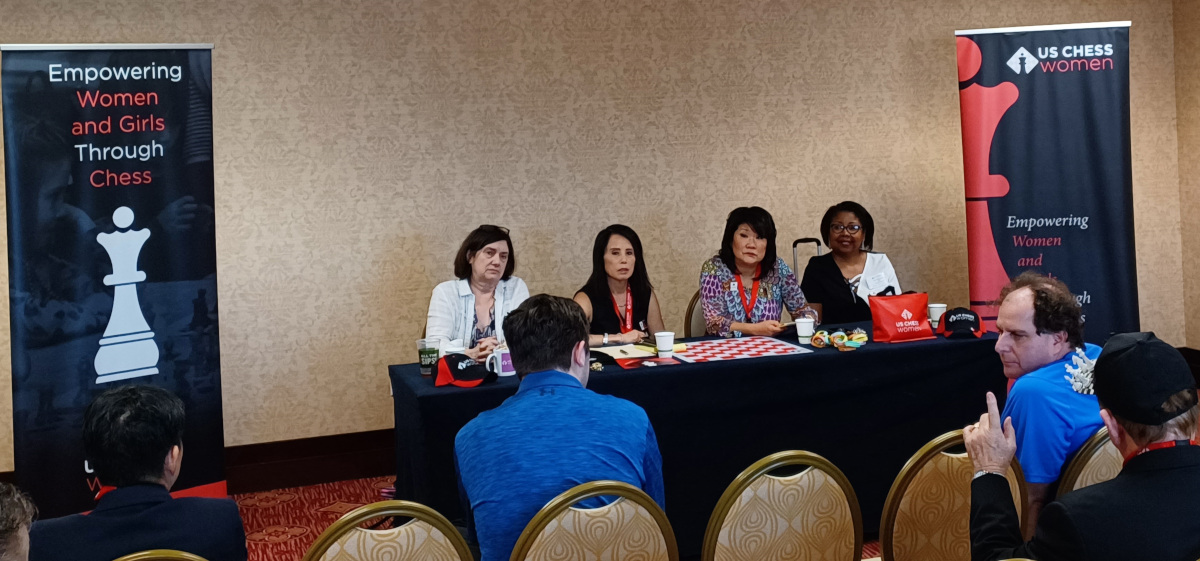
From left to right: Leila D’Aquin, Kimberly Doo, Maureen Grimaud and Robin Ramson | Photo: Alexey Root
The Development Committee met next. It reported 1,188 unique donors in the 2022-2023 fiscal year. Some donations provide financial support to eligible Title I Schools to participate in US Chess-run national scholastic tournaments.
During the meeting of the U.S. Chess Trust, Managing Director Al Lawrence, President Beatriz Marinello, and Vice President for Scholastic Chess Sunil Weeramantry asked Recognitions Committee Chair John McCrary to give a history of the World Chess Hall of Fame. Among its many initiatives, the US Chess Trust is a partner in the World Chess Hall of Fame.

From left to right: John McCrary, Al Lawrence, Beatriz Marinello and Sunil Weeramantry | Photo: Alexey Root
August 4 Meetings
Two of the meetings on Friday, the Finance/Life Management Asset meeting and the States/Affiliates meeting, discussed sensitive topics, such as draft financial statements and who should run state chapters in Rhode Island and in the District of Columbia.
At its Staff Forum, US Chess employees responded to compliments and queries. Outgoing board member Fun Fong, of Georgia, praised quick reporting by Chess Life Online about Georgia winning the state versus state invitationals. Responding to whether US Chess plans a bigger social media presence, Dan Lucas replied that ideally Communications would gain a dedicated social media person. Even if that new position does not happen, Lucas said social media will be emphasized going forward.
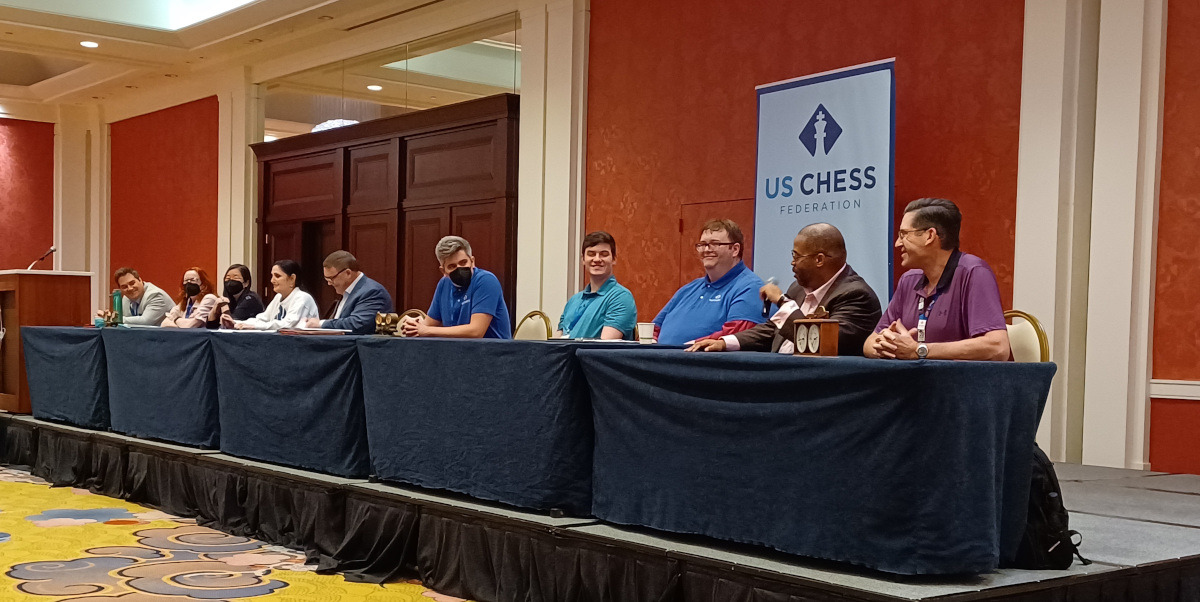
The Staff Forum | Photo: Alexey Root
When Friday’s meetings ended, the US Chess Awards Reception began. A list of award winners is at this link. Two of the winners were John D. Rockefeller V (Koltanowski Award: Gold) and Jon Edwards (Grandmaster of the Year). This past November, Edwards won the 32nd World Correspondence Championship and became an ICCF Grandmaster.
The Delegates Meeting on August 5 and 6 was wide-ranging and too long to summarize here. For an overview of what was debated, follow the linked documents on this US Chess webpage.
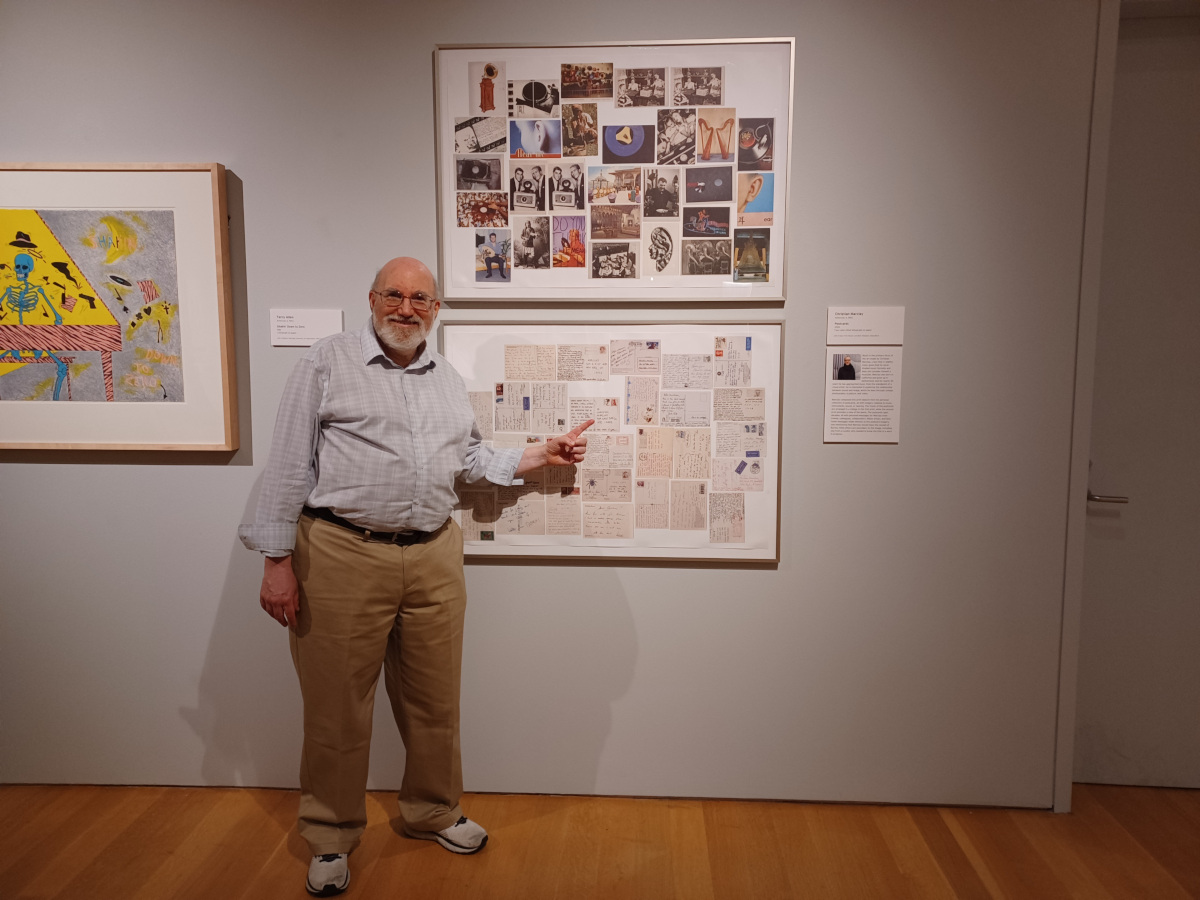
Jon Edwards at the Grand Rapids Art Museum | Photo: Alexey Root
President Ford and National Chess Day
The Gerald R. Ford Museum is the top tourist attraction in Grand Rapids, Michigan. The museum includes replicas of the Oval Office and the Cabinet Room. Gerald and his wife Betty grew up in Grand Rapids and they are buried on the grounds of the museum.
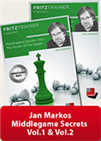 Let us learn together how to find the best spot for the queen in the early middle�game, how to navigate this piece around the board, how to time the queen attack, how to decide whether to exchange it or not, and much more!
Let us learn together how to find the best spot for the queen in the early middle�game, how to navigate this piece around the board, how to time the queen attack, how to decide whether to exchange it or not, and much more!In 1976, President Ford declared October 9 as National Chess Day. Annually since then, National Chess Day has been celebrated on the second Saturday of October.
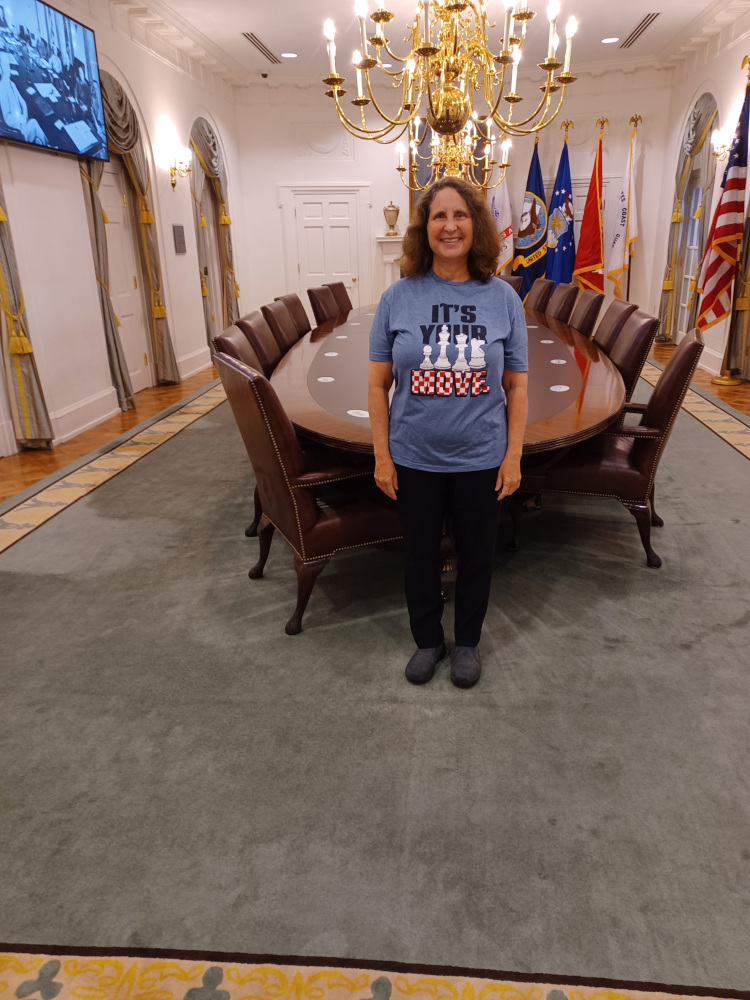
Alexey Root at the Gerald R. Ford Museum’s Cabinet Room
All available games - U.S. Open
These video courses feature a black repertoire against 1.d4, 1.Nf3 and 1.c4. The recommended variations are easy to learn and not difficult to remember, but also pose White serious challenges.
Links
